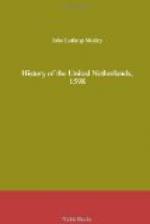much territory as the Spanish and Portuguese sea-captains
could circumnavigate and the pope in the plentitude
of his power and his generosity could bestow on his
fortunate son, in America; all this enormous proportion
of the habitable globe was the private property, of
Philip; who was the son of Charles, who was the son
of Joanna, who was the daughter of Isabella, whose
husband was Ferdinand. By what seems to us the
most whimsical of political arrangements, the Papuan
islander, the Calabrian peasant, the Amsterdam merchant,
the semi-civilized Aztec, the Moor of Barbary, the
Castilian grandee, the roving Camanche, the Guinea
negro, the Indian Brahmin, found themselves—could
they but have known it—fellow-citizens of
one commonwealth. Statutes of family descent,
aided by fraud, force, and chicane, had annexed the
various European sovereignties to the crown of Spain;
the genius of a Genoese sailor had given to it the
New World, and more recently the conquest of Portugal,
torn from hands not strong enough to defend the national
independence, had vested in the same sovereignty those
Oriental possessions which were due to the enterprise
of Vasco de Gama, his comrades and successors.
The, voyager, setting forth from the straits of Gibraltar,
circumnavigating the African headlands and Cape Comorin,
and sailing through the Molucca channel and past the
isles which bore the name of Philip in the Eastern
sea, gave the hand at last to his adventurous comrade,
who, starting from the same point, and following westward
in the track of Magellaens and under the Southern Cross,
coasted the shore of Patagonia, and threaded his path
through unmapped and unnumbered clusters of islands
in the Western Pacific; and during this spanning of
the earth’s whole circumference not an inch of
land or water was traversed that was not the domain
of Philip.
For the sea, too, was his as well as the dry land.
From Borneo to California the great ocean was but
a Spanish lake, as much the king’s private property
as his fish-ponds at the Escorial with their carp
and perch. No subjects but his dared to navigate
those sacred waters. Not a common highway of
the world’s commerce, but a private path for
the gratification of one human being’s vanity,
had thus been laid out by the bold navigators of the
sixteenth century.
It was for the Dutch rebels to try conclusions upon
this point, as they had done upon so many others,
with the master of the land and sea. The opening
scenes therefore in the great career of maritime adventure
and discovery by which these republicans were to make
themselves famous will soon engage the reader’s
attention.




